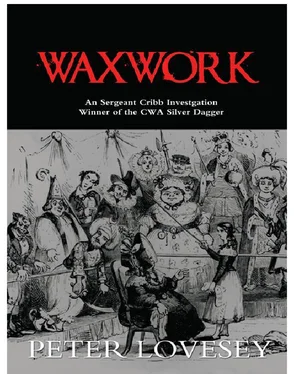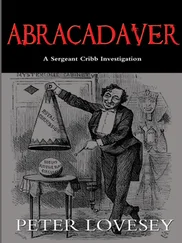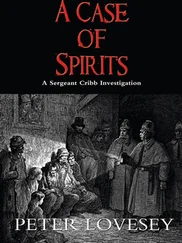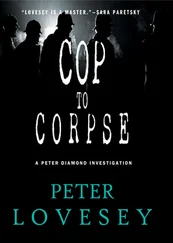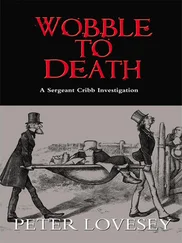Peter Lovesey - Waxwork
Здесь есть возможность читать онлайн «Peter Lovesey - Waxwork» весь текст электронной книги совершенно бесплатно (целиком полную версию без сокращений). В некоторых случаях можно слушать аудио, скачать через торрент в формате fb2 и присутствует краткое содержание. Жанр: Исторический детектив, на английском языке. Описание произведения, (предисловие) а так же отзывы посетителей доступны на портале библиотеки ЛибКат.
- Название:Waxwork
- Автор:
- Жанр:
- Год:неизвестен
- ISBN:нет данных
- Рейтинг книги:3 / 5. Голосов: 1
-
Избранное:Добавить в избранное
- Отзывы:
-
Ваша оценка:
- 60
- 1
- 2
- 3
- 4
- 5
Waxwork: краткое содержание, описание и аннотация
Предлагаем к чтению аннотацию, описание, краткое содержание или предисловие (зависит от того, что написал сам автор книги «Waxwork»). Если вы не нашли необходимую информацию о книге — напишите в комментариях, мы постараемся отыскать её.
Waxwork — читать онлайн бесплатно полную книгу (весь текст) целиком
Ниже представлен текст книги, разбитый по страницам. Система сохранения места последней прочитанной страницы, позволяет с удобством читать онлайн бесплатно книгу «Waxwork», без необходимости каждый раз заново искать на чём Вы остановились. Поставьте закладку, и сможете в любой момент перейти на страницу, на которой закончили чтение.
Интервал:
Закладка:
‘You must have gone back to the servants.’
‘Yes, I’m coming to that,’ Waterlow peevishly said. ‘I did, and I don’t mind telling you that I managed it without creating the least suspicion in the family. Two of the servants lived in, but a third, a housemaid of thirteen named Margaret Booth, resided in Brentford. “Resided” isn’t quite the word now that I recall the squalor of the street, but that’s of no importance. Margaret had been warned by Allingham in peril of her job not to make a statement of any kind to the police.’ He gave a belly-laugh. ‘Young Margaret wasn’t prepared for me to be seated in her own parlour beside her father when she came home. The old man describes himself as a docker. If you ask me, the only dock he regularly sees is the one at Brentford Police Court. He is habitually drunk. I was lucky to find him vertical, more or less, when I picked him up at the pub on the corner. By the time his daughter Margaret came home, I made sure Albert Booth was a sober and frightened man, and so was his wife. They were convinced I would get him sent down for three months’ hard if I didn’t get cooperation. Margaret’s resistance didn’t last long. She gave me what I wanted: a tolerable account of Miriam Cromer and her dealings with Josiah Perceval.’
‘She knew about the blackmail, did she?’
‘Lord, no, nothing so helpful as that. She told me that it was no secret below stairs that Mrs Cromer had a strong dislike for Perceval. Nobody knew why exactly, just that it had got worse in recent weeks. There were sometimes arguments upstairs when Mr Cromer was out, and Perceval seemed to get the better of them, which surprised the servants. They had thought of their mistress as iron-willed, more than a match for the likes of Perceval. What was said was not audible in the servants’ quarters, but they could tell when voices were raised, and they also knew by the state of Mrs Cromer’s eyes when she had been reduced to tears. That was as much as I got from Margaret Booth about what went on upstairs, but’-Waterlow beamed in self-congratulation-‘I persuaded her to talk about the other servants.’
Cribb tried to appear impressed. Waterlow in the old days had put in less time on the beat than anyone at Stoke Newington. The titbits of gossip any bright young constable picked up automatically from making conversation at doorways were outside his experience. He had never been invited in for a slice of rabbit pie in his life. So it was a triumph to have coaxed a few confidences from Margaret Booth. Cribb listened and made an occasional note. He could raise no interest in how the housekeeper embezzled the accounts and what the parlourmaid got up to with the grocer’s boy. He wanted to know about Miriam Cromer.
What was she like, this woman who would hang unless he found a flaw in her confession? In any regular investigation he would have started by interviewing her, forming an impression of her character. There was more to detective work than clues and statements. It involved people, their ambitions and fears, innocence and guilt. You needed solid evidence to determine the truth, but you could divine a lot by meeting them face to face. Whatever had happened that afternoon in Park Lodge, the question for Cribb was whether Miriam Cromer had done what she claimed. She was the focus of his investigation, but because authority deemed it inappropriate he was prevented from meeting her. He was obliged to glean what he could at second hand, from people whose recollection would be coloured by their own conceits and prejudices. Waterlow was the first.
‘When I visited the house that evening to put my information to practical use,’ the self-advertisement ran on, ‘I used the tradesmen’s entrance, naturally. Nobody upstairs knew I was making a second visit to Park Lodge. I relied on what I knew to keep the servants’ tongues from wagging.’
‘What did the housekeeper tell you?’ Cribb asked, his patience on the ebb.
Waterlow smacked his lips. ‘She was a frightened woman before I was through, I can tell you, Cribb. What did I learn from her? Why, the very thing I needed: the dates when Mrs Cromer had gone into the studio to talk to Perceval and their raised voices had been heard downstairs. She knew exactly when it happened because the meetings took place when the master of the house was out for the day and not expected back till late in the evening. She has to keep a note of his days out to get her catering right. She keeps a calendar in the kitchen on which such things are marked. There were four occasions between October and March when Mrs Cromer and Perceval had a “ruction”, as she called it. I noted them carefully in my pocket-book.’
‘What form did these ructions take?’ asked Cribb.
‘There was a difference of opinion about that. Everyone in the servants’ quarters agreed that there were raised voices, and the parlourmaid told me Mrs Cromer was reduced to tears, but the housekeeper insisted that they never heard weeping. She said the mistress was red-eyed with anger. I think she was probably right. I don’t see Miriam Cromer dabbing her eyes with a lace handkerchief, do you?’
‘I haven’t met the lady.’
Waterlow accepted this with a nod. ‘Well, as I say, I preferred to believe the housekeeper, but the parlourmaid did give me another piece of information that I put to good use. She had twice observed that on days after these scenes her mistress went out for a morning walk. There may seem nothing remarkable to you in that, Sergeant, but it was a departure from normal practice. She was in the habit of taking a daily constitutional in the Botanic Gardens. This is where local knowledge came in useful. The Gardens being part of my patch, I happen to know that they don’t open in the morning. One o’clock till sunset are the hours. I asked the parlourmaid if she had observed which direction Mrs Cromer had taken. She told me she had watched from the breakfast room. She was interested, because it was such an uncommon thing. Mrs Cromer had walked up to the main road and turned right, towards Kew Bridge.’ Waterlow grinned again. ‘A stroll by the Thames? Feeding the ducks? Not on your life. She was going to Brentford to put jewellery in pawn, and I proved it!’
‘How did you get on to that, sir?’
‘Smart detective work. I told you just now that Perceval was in trouble with the bookmakers at the time of his death. Well, he had been running up debts for a year or more. He made occasional repayments to show good faith. He dealt with Harry Cobb’s, the Richmond firm. I went to see them and took a note of those repayments, the dates and sums involved. I compared them with the dates the housekeeper had given me, and, what do you know, they matched! It was obvious what the connection was: Perceval had persuaded Mrs Cromer to help him meet his debts, except that persuasion didn’t come in to it. As I discovered from the housekeeper, the lady of the house had precious little ready money of her own. She didn’t need it. Women of her class don’t spend money. They have accounts, which their husbands settle quarterly. They keep a few shillings in their purse for emergencies, but nothing like the money Perceval was getting-twelve, fifteen pounds. To lay her hands on as much of the ready as that, she would need to go to a bank or a moneylender. I verified that she had no account of her own.’ Waterlow waved his hand expansively. ‘So she must have raised a loan, and that’s where local knowledge came in again. The nearest pawnshop is in Brentford High Street.’ He counted on his fingers. ‘Four visits. October, December, January, February. All confirmed by the pawnbroker. Jewellery each time. Good stuff, too, that could have raised more, but she was glad to take the first price he offered. He would have made a splendid prosecution witness, that pawnbroker. He gave me a first-rate description, from her plush hat to her brown buttoned boots.’
Читать дальшеИнтервал:
Закладка:
Похожие книги на «Waxwork»
Представляем Вашему вниманию похожие книги на «Waxwork» списком для выбора. Мы отобрали схожую по названию и смыслу литературу в надежде предоставить читателям больше вариантов отыскать новые, интересные, ещё непрочитанные произведения.
Обсуждение, отзывы о книге «Waxwork» и просто собственные мнения читателей. Оставьте ваши комментарии, напишите, что Вы думаете о произведении, его смысле или главных героях. Укажите что конкретно понравилось, а что нет, и почему Вы так считаете.
